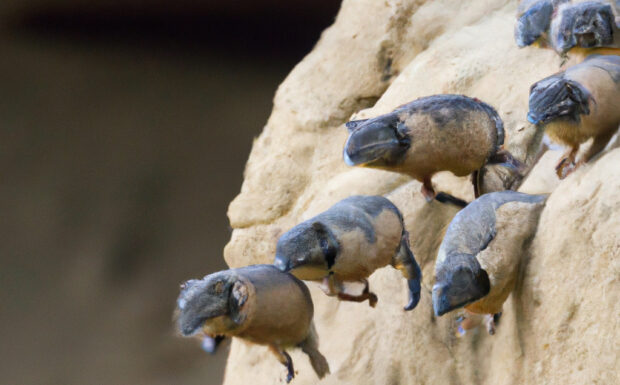
Is there such a thing as a mindful lemming? The phrase feels like a contradiction in terms: we think of lemmings following each other into collective suicide as they jump off a cliff.
A fable: Albert & Joanna
Let’s imagine that, in the pack, a few lemmings are a bit more aware of what is happening. Let’s call one Albert and the other Joanna:
– What am I doing? asks Albert. Is this really what I want?
– I know it’s not what I want, says Joanna. But I have no idea how to stop that.
Indeed, no matter how mindful you are, you cannot stop the stampede or step out of the herd if you are in the middle of a runaway pack.
Human lemmings
Humans feel contempt for lemmings, but our smug sense of superiority is unwarranted. It’s true that lemmings do something to control overpopulation, but it’s not collective suicide. They migrate.
All the stuff about jumping off a cliff is a myth. I am feeding off stereotypes when I refer to this myth as reality. Although the illustration in this article looks like a photo, it is not. It is AI-generated, and its realistic appearance bypasses logical thinking and reinforces our biases.
Lemmings don’t behave like lemmings, but humans often do. We are very adept at mindlessly following the lead of others or engaging in groupthink, as we do when we perpetuate the unfounded stereotype of lemmings. We have a poor track record of stopping before the cliff. Look at what happens in the tit-for-tat cycle of many wars or our stampede toward the climate catastrophe.
Mindfulness
Some of us are like Albert and Joanna: we know what is happening and see the catastrophe unfolding. But being aware of a situation does not necessarily mean having the power to change it.
Our mind is capable of imagining solutions that are beyond our power to implement. An example is Archimedes saying that he could move the earth with a firm spot to stand on and a lever. This is a great concept, except for the availability of the firm spot or the lever and the inconvenient truth that we are on the earth, not outside of it.
And so, we oscillate between grandiosity and despair when we try to change the direction of the human herd as it marches in lockstep toward destructive wars or runs toward the cliff of climate catastrophe. Nor can we step out of the pack and be spared the consequences of human folly. For better or worse, our individual destinies are tied to the rest of humanity.
What can we do?
As the person writing this article, I have the option to switch to a reassuring, omniscient tone: Don’t worry, reader, there is a solution, and, in my great wisdom, I see it and will share it. Of course, this is not the case. I am part of the galloping herd, just like you and everybody else. So, all I can do is share what gives me a sense of hope.
Something shifts in me when I think of an impending catastrophe as a defining moment. It is an invitation to rise to the occasion. It does not mean we need to accomplish heroic deeds to stave off the sense of our insignificance.
The intensity of the occasion calls for a falling off of all pretenses. The poignant awareness of our limitations is essential to rising to the occasion. So is the realization of how much we need company in our misery. How much it matters to take action together, or even just to be in it together.
Mindful Lemmings peer group
Monday, April 1, 2024, at 12 noon New York time
This is a one-hour Zoom gathering.
This will be a safe and stimulating environment to further explore how we deal with the powerlessness we experience amid collective madness, such as wars or the climate catastrophe.
Free. Please register to get Zoom info and email reminder.
Note: when you register and give your geographic location, the server will indicate your local time (e.g. 9 am Los Angeles time, or 5 pm London time) instead of the New York time.
Register for Event